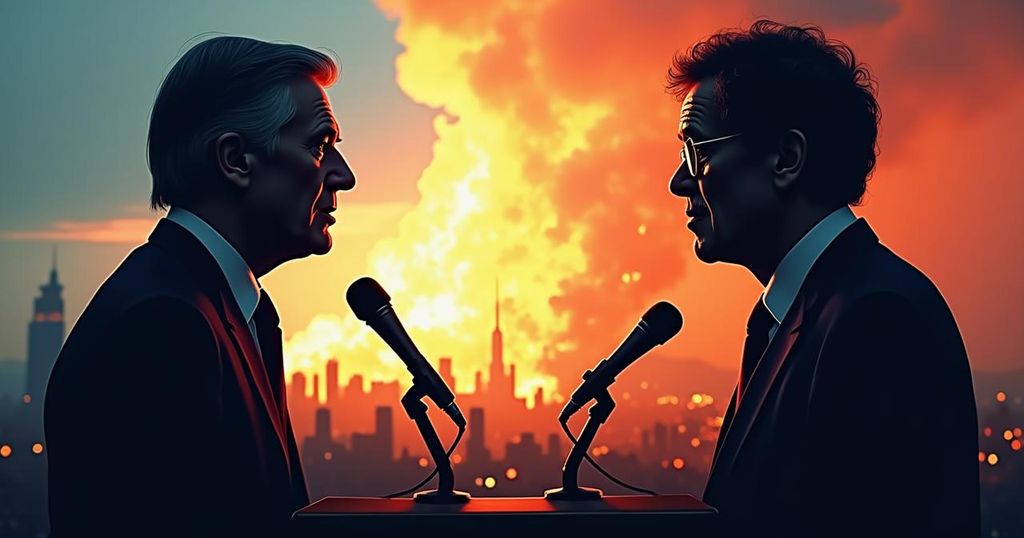Vance and Walz Clash in Vice Presidential Debate on Key Issues

In a highly anticipated debate, Republican Senator JD Vance of Ohio and Democratic Governor Tim Walz of Minnesota confronted each other on October 1st, discussing pressing issues like the Middle East conflict, climate change, and immigration policies just five weeks before Election Day. Both candidates expelled strong critiques of each other’s political alliances and stances, setting the stage for an intense electoral race.
On October 1, 2023, Republican Senator JD Vance from Ohio and Democratic Governor Tim Walz of Minnesota engaged in their inaugural and singular debate for the vice presidential candidates, coinciding with a mere five weeks before Election Day. The debate commenced with an exchange of handshakes but quickly transitioned into heated debates regarding the Middle East, climate change, and immigration policies The discussion kicked off with a pressing question about global crises, particularly the ongoing conflict in the Middle East, emphasizing Iran’s recent missile strike on Israel. Governor Walz underscored the necessity for “steady leadership” in tumultuous times, criticizing former President Donald Trump for his perceived ineffectiveness. “It’s clear and the world saw it on that debate stage a few weeks ago, a nearly 80-year-old Donald Trump talking about crowd sizes is not what we need in this moment,” he stated, labeling Trump as “dangerous.” Responding to Walz’s observations, Senator Vance recounted his own background while asserting the importance of maintaining global stability, casting the previous administration in a favorable light. “Donald Trump actually delivered stability in the world and he did it by establishing effective deterrents,” asserted Vance, who also criticized the current administration for allowing Iran to access substantial unfrozen assets and linking it to rising tensions. As Hurricane Helene wreaked havoc in the Atlantic, the conversation seamlessly transitioned to climate change. Both candidates expressed empathy for the victims of the disaster, with Vance noting his commitment to prioritizing American citizens during crises under a future Trump presidency. He defended his stance on environmental policy, asserting that economic growth and environmental stewardship can coexist. “I think it’s important to say, Donald Trump and I support clean air and clean water,” he remarked, while condemning the policies of the current administration as harmful to American manufacturing. Governor Walz countered Vance’s points by advancing the argument that climate change is an urgent issue necessitating immediate action, citing the substantial investments made by the Harris administration to combat its effects. “Climate change roared onto the scene faster and stronger than anything we’ve seen,” Walz noted, emphasizing the need for transition to renewable energy while maintaining a strong fossil fuel output as part of a balanced approach. The debate further encompassed immigration concerns, particularly the ramifications of previous administrations’ policies. Senator Vance criticized the current administration’s approaches, referencing a surge in illegal immigration and associated narcotic influxes. The debate, held at CBS Broadcast Center in New York City, spanned 90 minutes, moderated by distinguished journalists Norah O’Donnell and Margaret Brennan, and was devoid of a live audience, ensuring an orderly and focused discussion. Both candidates adhered to strict rules, with the format designed to encourage direct exchanges of ideas and rebuttals without pre-prepared statements or external communication. Despite differing ideologies, the debate exemplified the tensions inherent in a tightening presidential race, highlighting the need for clear and actionable policy discussions as the election approached.
The vice presidential debate between JD Vance and Tim Walz comes at a critical juncture in the election cycle, with only five weeks remaining until Election Day. This debate serves as the primary opportunity for the candidates to present their positions to the public. Key issues such as international conflicts, climate change, and immigration are central to voter concerns and were effectively explored during the debate. The candidates represent polar opposite political ideologies, reflecting a wider national discourse on these pressing matters, making this debate vital for voters in swing states.
In summary, the vice presidential debate between Senator JD Vance and Governor Tim Walz showcased a range of significant issues, including foreign policy, climate change, and immigration. Each candidate articulated their views while leveraging their partisan strengths to appeal to voters. The engagement emphasized the stark contrasts in their political visions, making it apparent that the upcoming election will hinge on how effectively each can convey their strategies and address the concerns of the electorate in critical swing states.
Original Source: www.upi.com







